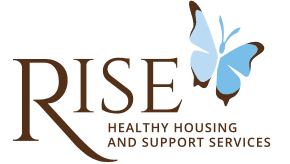RISE Treatment Approaches include Trauma-Informed Care, Person Centered Care, Harm Reduction, and the Housing First Approach.
 Trauma-Informed Care
Trauma-Informed Care
Trauma-Informed Care is an approach that recognizes the prevalence of adverse experiences in our society, and how an individual’s experiences and environments can interrupt their ability to experience growth with a sense of emotional or physical safety.
A trauma-informed approach recognizes the underlying life stressors and triggers behind unhealthy, maladaptive behaviors, acknowledging the role trauma may play in an individual’s life.
RISE embraces a trauma-informed care approach which entails:
- Realizing the widespread impact of trauma and understanding potential paths for recovery.
- Recognizing the signs and symptoms of trauma in clients, families, staff, and others involved with the system.
- Responding by fully integrating knowledge about trauma into policies, procedures, and practices.
- Seeking to actively resist re-traumatization.
We believe that in order to maximize the impact of trauma-informed care, staff needs to be knowledgeable and understanding of trauma and its far-reaching implications. RISE is committed to develop a trauma-informed culture within our agency to assist the people we work with to overcome their traumatic experiences.
For more information about trauma-informed care please see SAMHSA’s Concept of Trauma and Guidance for a Trauma-Informed Approach.
Person Centered Care
Person Centered Care is defined as “empowering people to take charge of their own health and wellbeing rather than being passive recipients of services” – World Health Organization.
This approach is based on the belief that people’s views, input, and experiences can help improve their overall health and wellbeing.
RISE is committed to providing person centered care. We believe:
- When people are involved in their own care, they are often more active in looking after themselves.
- When people feel respected, they are more likely to engage in services.
- When people experience compassion and empathy from their support providers, they take responsibility for their care.
- We people are viewed as individuals, they feel valued and satisfied with the care they receive.
The main goal of a person centered care approach is to improve individual outcomes. At RISE we honor each person’s desires, values, family situations, social circumstances and lifestyles. We work together with each person to develop a plan of care that will achieve the best possible outcomes.
For more information about person centered care, please see the Health Innovation Network’s What is Person Centered Care and Why is it Important?
Harm Reduction
Harm Reduction is an innovative approach to behavioral health. Not everyone is ready, willing or able to completely stop harmful behaviors when they enter treatment. The goal of Harm Reduction is to lessen the harm associated with certain behaviors until they are ready to stop them altogether. These behaviors can include impulsive decision making, inability to manage treatment and medication management, self-injurious behaviors, or substance use.
RISE employs a harm reduction approach that incorporates a spectrum of strategies that includes:
- Honoring each person’s unique needs and life challenges.
- Accepting that certain behaviors are part of our world and we choose to work to minimize them rather than ignore or condemn them.
- Understanding that reasons for engaging in these types of behaviors is complex and multi-faceted and acknowledging there are safe ways to reduce or minimize them.
- Non-judgmental, trauma-informed, person centered care aimed at reducing harm.
- Involving people in the development of their care.
- Recognizing that the realities of social inequalities, such as poverty, racism, past trauma and social isolation, affect people’s capacity for effectively managing their behavior.
- Acknowledging the real and tragic harm and danger associated with certain behaviors.
For more information about Harm Reduction, please see the National Harm Reduction Coalition’s Principles of Harm Reduction.
 The Housing First Approach
The Housing First Approach
Housing First is an approach to quickly and successfully connect individuals and families experiencing homelessness to permanent housing. Housing First does not require that people commit to sobriety, treatment, or service participation in order to obtain housing.
Housing First is based on the premise that housing is the foundation for life improvement. Thus, we believe in putting housing first. When people have a safe, affordable place to live, they can focus on making other positive changes in their lives.
Supportive services are offered to help people maintain housing stability and prevent returning to homelessness.
For more information about the Housing First Approach please read the HUD Exchange’s Housing First in Permanent Supportive Housing Brief.



